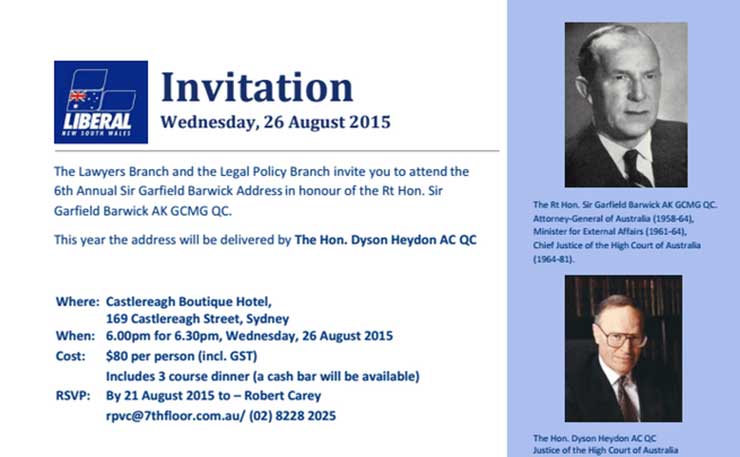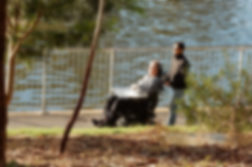The Abbott government has been straining at the bounds of satire for some time now. But the slapstick shows no sign of abating.
On Friday, the Australian Border Force announced and then cancelled its so-called “Operation Fortitude”, which appeared to plan a warrantless stop-and-search sweep of Melbourne’s CBD and public transport system for visa overstayers.
The fiasco disintegrated within hours after farcical scenes in which Border Force Commissioner Roman Quaedvlieg blamed a hapless underling, and claimed his responsible Minister, Peter Dutton, knew nothing about it.
Dutton disappeared for several days before surfacing to claim he hadn’t read the emails sent to his office.
Those who thought Australian politics couldn’t get any sillier didn’t reckon with today’s effort from Dyson Heydon, Commissioner of Royal Commission into Trade Union Governance and Corruption.
The decision by Heydon to clear himself of bias offered plenty of black comedy of its own.
In his judgment, Heydon admitted he could neither send nor receive emails, but instead needed them printed out for him.
Heydon’s judgment relied on the assertion that he was not, in fact, biased (agreed to by the trade unions in their arguments). The question then became whether one of those handy legal fictions, the “fair-minded lay observer”, would think that Heydon was biased.
Heydon decided that no, such a fair and balanced fellow could by no means come to that conclusion. Accordingly, the show must go on. The Royal Commission will get back to its onerous duties of investigating low-level trade union malfeasance, and questioning current and former Labor Party leaders.
Close reading of the judgment is best left to the sharp-eyed legal analysts, but there is plenty in Heydon’s judgment that will be politically controversial.
Heydon sets out a three-step rule for the test of what a reasonable observer might apprehend as bias. He considers two different arguments, and concludes they both fail on all tests. The score at full-time is 0-6 – quite a drubbing for the applicants.
I submit many voters will take issue with several of Heydon’s claims.
Perhaps most controversially, he rules that the Royal Commission is itself not politically controversial. So, the Commissioner argues, Julia Gillard was not called before the TURC because she just happened to be a Labor prime minister, but simply because “a long time ago she acted as a solicitor for an official who was successively Western Australian State Secretary and Victorian State Secretary of the AWU.” Bill Shorten was there because he just happened to be the former boss of the AWU.
This may be true as a detail of law, but in political terms it’s a highly selective reading of history.
A Royal Commission into Julia Gillard’s activities at Slater and Gordon in relation to the AWU was an election promise of the Liberal Opposition, a promise made while Julia Gillard was the Prime Minister.
On 29 November 2012 Tony Abbott gave a speech in the House of Representatives canvassing the actions of Gillard in the AWU affair. “Let us have the judicial inquiry that Mr Ian Cambridge, the then National Secretary of the Australian Workers Union, was calling for at the time and has been calling for ever since,” he said.
At the time, Abbott explicitly described the subject of the inquiry as the AWU “cold case”, and Gillard’s role in it.
Heydon doesn’t mention any of this.
He also claims that the Liberal Party fundraiser was not a reason for anyone to observe him as biased. “There is no reason to think that the fair-minded observer might apprehend that my intention in agreeing to give the Address was to raise funds or assist in raising funds or gathering support for the Liberal Party,” he wrote.
Clearly, this is an assertion that might struggle in the court of public opinion. In today’s highly-polarised political environment there will be many observers, fair-minded or not, who will not accept that conclusion.
Ordinary citizens may not understand the law. But that means they might also find something not altogether convincing about an umpire who judges himself.
It seems likely the ACTU and other trade unions that brought this submission may well go on with the legal action, and appeal to the Federal Court. What incentive is there not to?
As a result, the Trade Union Royal Commission will continue to be mired in political controversy. Whether the Commissioner himself believes that to be the case is essentially immaterial, because political controversy is not subject to the rule of law.
Even if the Royal Commission survives the impending legal appeal it’s hard to believe this episode will banish the partisan characterisation it has assumed, particularly for many on the left. Even Heydon’s supporters, I suspect, will start to question his judgment in ploughing on.
As Heydon is drawn further into the public debate, the public is getting greater opportunities to examine his highly conservative views. I fear this may not prove entirely positive for Heydon’s long-term reputation.
The public sphere is simply larger than a particular royal commission, and indeed of the law itself. Even if the Royal Commission continues, the very fact that it is still in the news and still a subject of heated social media debate almost guarantees that it will remain controversial. The animus will continue.
Needless to say, the government was delighted by today’s judgment. With typical overreach Attorney-General George Brandis proclaimed that “Dyson Heydon is to the union movement in Australia today what Tony Fitzgerald was to police corruption in Queensland in the 1980s.”
Perhaps Brandis’ bluster was understandable. Chances to get on the front foot have been rare in these fiasco-prone times.
But I wonder if Labor will be that disappointed either. At one stage this year, the trade union Royal Commission loomed as potentially fatal to Bill Shorten’s career. But the ongoing controversy has blunted the blowback. Labor has always characterised the Royal Commission as a politically motivated crusade against organised labour. Nothing that Heydon wrote today will soften Labor’s tone.
As today’s judgement was handed down Labor’s Mark Dreyfus said simply: “there is no doubt that this scandal has damaged the Royal Commission beyond repair”.
And so the Abbott government, and its union inquisition, lurches on. Tomorrow seems sure to bring yet another disaster.

Donate To New Matilda
New Matilda is a small, independent media outlet. We survive through reader contributions, and never losing a lawsuit. If you got something from this article, giving something back helps us to continue speaking truth to power. Every little bit counts.




